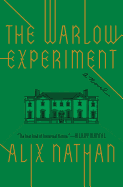
The year is 1793 and Herbert Powyss, gentleman farmer and amateur botanist, has hit upon an idea for an experiment to establish him as a true scientist: for seven years, a volunteer will live in complete isolation in a set of apartments two stories below his manor. This man will be given the same food that Powyss is served, with books and writing material to record his experience. Upon the completion of the experiment, he will receive £50 a year for the rest of his life. The only person who answers Powyss's advertisement is John Warlow, a laborer with a wife and children to support.
From a passing reference in a historical source about an actual experiment of this kind, Alix Nathan (The Flight of Sarah Battle) has constructed a fable about power. Warlow is trapped in an experiment for which he was never well suited, being semi-literate and unable to express himself in the journal, but which only he was desperate enough to accept. The absurdity of expecting him to entertain himself with Robinson Crusoe and a chamber organ is emphasized by every passage written in his point of view, effectively conveyed in halting, stunted language. Meanwhile, Powyss struggles with his unusual position of responsibility for Warlow's wife and family. The imbalance between these two and the effect it has on both could have been a book on its own, but Nathan puts it into further context as the ideas of the Enlightenment and the revolution in France reach the servants at the manor. The result turns The Warlow Experiment into a study of a microcosm in which an imbalance of power has devastating effects on both the person above and below, but infinitely worse for the latter. --Kristen Allen-Vogel, information services librarian at Dayton Metro Library

